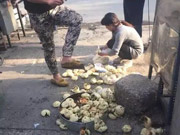

Chinese Premier Li Keqiang speaks during the general debate of the UN General Assembly at the UN headquarters in New York Sept. 21, 2016. Premier Li called for joint efforts to address sustainable development, global challenges. (Xinhua/Li Tao)
BEIJING, Sept. 27 -- Chinese Premier Li Keqiang is set to land in Beijing on Wednesday after a fruitful foreign trip, during which he attended the 71st session of the United Nations (UN) General Assembly and paid official visits to Canada and Cuba.
The trip marked several "firsts," namely Li's first appearance at the UN General Assembly, the first held annual dialogue between a Chinese premier and a Canadian prime minister, and the first official visit to Cuba by a Chinese premier in 56 years since the two countries established diplomatic ties.
Li presented Chinese solutions to various global challenges and bolstered ties with both Canada and Cuba, experts observed.
HIGHLIGHTS OF KEY RESULTS, PROPOSALS AT UN HEADQUARTERS
The Chinese premier concluded his visit to the UN headquarters, which included attending the UN General Assembly, and conferences on refugees, immigration and on sustainable development.
His New York tour also displayed China's outlook for China-U.S. relations while assuring the world of China's determination to maintain steady economic growth and seek greater integration with the global economy.
During his UN meetings, Li pledged hundreds of millions of dollars in aid to help solve the most pressing challenges facing the world from refugee and migration issues to the fight against AIDS, Tuberculosis and Malaria.
On the sidelines of the conferences, Li met with UN Secretary-General Ban Ki-moon and held talks with leaders of the United States, France, New Zealand and Pakistan.
The topics of the talks ranged from the issue of development and climate change, to the situation on the Korean Peninsula, China's continuous support for the United Nations, its Charter, and its role in international affairs and safeguarding world peace and development. The global economic recovery and China's engagement with other countries through the Belt and Road Initiative were also discussed.
Meanwhile, the Chinese premier interacted with American business circles, prominent personalities and media, including former U.S. Secretary of State Henry Kissinger, former U.S. Treasury Secretary Henry Paulson, and former New York City Mayor Michael Bloomberg.
HIGHLIGHTS OF VISIT TO CANADA
After New York, Li wrapped up a visit to Canada with a string of promising outcomes. The Chinese and Canadian sides issued a joint statement in Ottawa listing 29 important agreements.
In solidifying a new chapter in their strategic partnership, the two sides held the successful inaugural meeting of their Annual Dialogue between the Chinese premier and the Canadian prime minister.
They announced the goal of doubling bilateral trade by 2025 based on 2015 statistics.
China and Canada acknowledged the interconnected nature of the two economies and the untapped potential of the China-Canada economic and commercial relationship, and agreed to launch exploratory discussions for a possible China-Canada Free Trade Agreement (FTA).
"Signing an FTA with Canada will be a challenge for China as it will have to bear greater pressure than the developed countries," Li said at a business forum in Montreal. "However, China is willing to engage in FTA talks with Canada to press the low-end domestic enterprises to move up the ladder."
The two governments also agreed to cooperate in third-party markets in order to encourage and support enterprises of both countries to pursue opportunities in those markets.
During his stay in the North American country, Li visited the renowned Canadian ice hockey team Montreal Canadiens, and dropped the first puck at a training match.
Accompanied by Canadian Prime Minister Justin Trudeau, Li traveled to the Bell Centre, where the two leaders were briefed about the history of the club, which was founded in 1909 and has won 24 National Hockey League championships.
Li said he was pleased to experience Canada's national sport together with Trudeau in Montreal, the cradle of ice hockey.
HIGHLIGHTS OF VISIT TO CUBA
During the first official visit to Cuba by a Chinese premier, the two countries signed more than 20 cooperation agreements covering a wide range of areas.
Many experts said the trip has helped boost economic cooperation between Havana and Beijing and promote the Cuba-China comprehensive strategic partnership, while turning a new page in the relations between the two traditionally friendly nations after they established diplomatic ties 56 years ago.
When meeting with Cuban President Raul Castro at the Palace of the Revolution in Havana, Li pledged to further promote bilateral ties through further high-level exchanges and boosting economic cooperation.
Hailing the progress made in relations, Li said China has firmly adhered to the policy of friendly ties, supported Cuba in following a socialist path and promoted bilateral pragmatic cooperation.
China stands ready to deepen economic ties and work closely with Cuba on international affairs so as to push forward bilateral ties, said Li.
Cuban state media paid close attention to Premier Li's visit,highlighted his visit to Havana with photos and reports. Ordinary also Cubans had plenty to say about the visit.
"Cuba's relations with China have been very stable for many years," said Mario Hernandez, a 58-year-old worker. "I think this visit will be very important for Cuba because it will reaffirm economic, political and social links with Beijing."
 |

 Who Will Fit The Chinese Roles In Game Of Thrones?
Who Will Fit The Chinese Roles In Game Of Thrones? China's Hubei Shennongjia added to World Heritage List
China's Hubei Shennongjia added to World Heritage List Cute Dog At Fruit Stand Becomes Latest Internet Sensation
Cute Dog At Fruit Stand Becomes Latest Internet Sensation Top 10 livable Chinese cities
Top 10 livable Chinese cities The last primitive tribe in China
The last primitive tribe in China China's first intelligent security robot debuts in Chongqing
China's first intelligent security robot debuts in Chongqing A Total of 3,552 Subscribers Vanish In Two Days; YouTube Closes All Doors to Users’ Inquiries
A Total of 3,552 Subscribers Vanish In Two Days; YouTube Closes All Doors to Users’ Inquiries Out of this world! Futuristic UFO-shaped yacht has its own garden and a stunning underwater viewing deck
Out of this world! Futuristic UFO-shaped yacht has its own garden and a stunning underwater viewing deck An old tea house in Chengdu
An old tea house in Chengdu Furious Customer Crushes All the Buns from Vendor Just Because He Was Given the Wrong Flavor
Furious Customer Crushes All the Buns from Vendor Just Because He Was Given the Wrong Flavor